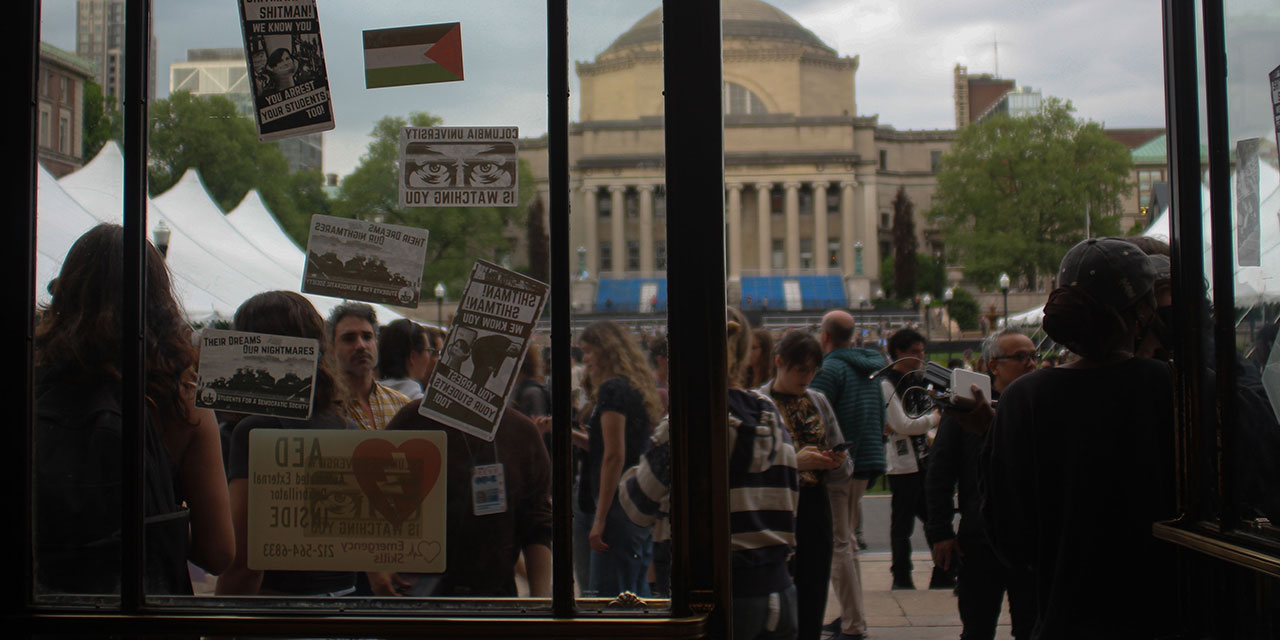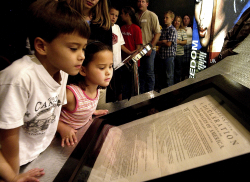
Last week, Columbia University’s acting president, Claire Shipman, announced “Additional Commitments to Combating Antisemitism,” which listed the Ivy League school’s “ongoing efforts” against Jew hatred on campus. Among them: “Columbia has not, and will not, recognize or meet with the group that calls itself ‘Columbia University Apartheid Divest’ (CUAD), its representatives, or any of its affiliated organizations” (emphasis added).
CUAD is a coalition of groups that includes Student Workers of Columbia (SWC), the local United Auto Workers graduate student union. The university appears inadvertently to have signaled that it will not recognize the union.
Finally, a reason to check your email.
Sign up for our free newsletter today.
What seems like an error is really an opportunity. Columbia’s student union—like student unions across the country—has long been a disruptive and dysfunctional force on campus. Columbia students should use this opportunity to take an unprecedented step: decertify their union.
Columbia seems to have backed itself into a corner. If it recognizes SWC, critics could accuse the university of failing to follow its stated policy. If it does not recognize SWC, the university could face an “unfair labor practice” charge from the union.
“It is pretty easy and painless to file charges,” said Glenn Taubman, a staff attorney at the National Right to Work Legal Defense Foundation. “They are a roll of the dice that take years to litigate.”
SWC has a history of open conflict with the university. The student-run Columbia Daily Spectator has reported dozens of articles about the union, including about SWC picketing, striking, and filing unfair labor practice charges. The union has been especially combative since Hamas terrorists attacked Israel on October 7, 2023. In its first post following the worst massacre of Jews since the Holocaust, SWC released a “statement of solidarity with Palestine” and called for “an end to Columbia’s financial and structural support of occupation, apartheid, and genocide.” In 2024, the union hosted an event with a pro-North Korea group that opposes “all intervention, occupation, and military escalation by the US on the Korean peninsula.”
The group is also tied to the lawlessness that gripped Columbia’s campus after October 7. CUAD leader Mahmoud Khalil, for example, was a card-carrying SWC member. In March, the university expelled SWC’s president, Grant Miner, for occupying Hamilton Hall. SWC’s contract with the university expired on July 1, but the union refuses to bargain without Miner, a CUAD member who enjoys the “unwavering solidarity” of the Communist Party USA’s Labor Commission.
Compounding the conflict, last week Columbia suspended or expelled nearly 70 students who participated in CUAD-led demonstrations. In response, SWC shared CUAD’s press release, noting that five SWC members were among those disciplined. Johannah King-Slutzky, SWC’s sergeant at arms and a CUAD member who infamously demanded “humanitarian aid” for the Hamilton Hall occupiers, was likely suspended over her arrest at one of the demonstrations.
Columbia students are fed up with their union’s focus on radicalism over bread-and-butter issues. “As a Jewish Israeli student at Columbia, the union has done absolutely nothing for me,” said Alon Levin, a graduate student in electrical engineering. “I have heard more blatantly racist and discriminatory language from them than anything that would remotely resemble aiding me in, say, addressing my cost of living or my health insurance concerns.”
The problem with graduate student unions is not limited to Columbia, as I learned at MIT. On Oct. 9, 2023, my union’s openly socialist staff organizer, Jeff Rosenberg, attended a “Victory is Ours” rally, where he told NBC10 Boston, “Those who rebel against oppression cannot be blamed for rebelling against that repression.” When I asked for a religious accommodation that would divert my dues to charity, the union denied my request, telling me in a letter that “no principles, teachings or tenets of Judaism prohibit membership in or the payment of dues or fees to a labor union.”
These unions do not even achieve their most basic purpose. Graduate students at Princeton University found that, after union fees, “MIT’s union contract did not make students more money.” The prospect of constant conflict in exchange for an effective pay cut explains why, in 2024, Princeton students overwhelmingly rejected union certification.
Now that SWC’s contract has expired, Columbia students have an opportunity to change course. Under the National Labor Relations Act, all it takes is 30 percent of the bargaining unit to petition for a decertification election, followed by a simple majority vote. SWC knows this, which is why it is rushing to extend its previous contract.
“As far as I know, no grad student union has ever decertified,” said Taubman. “I think this would be a first.”
Unlike other union votes, a decertification election is open to the entire bargaining unit, and only the bargaining unit. SWC has not had such an election since it was first certified in 2016. Back then, out of 4,256 eligible voters, 48 percent did not vote, and only 38 percent supported the union. I suspect that figure would be even lower today.
It’s time to end the constant conflict on campus. In 2024, Princeton students showed that, given the chance, graduate students will reject Marxist, anti-Semitic unions. Columbia students should seize the chance to do the same.
City Journal is a publication of the Manhattan Institute for Policy Research (MI), a leading free-market think tank. Are you interested in supporting the magazine? As a 501(c)(3) nonprofit, donations in support of MI and City Journal are fully tax-deductible as provided by law (EIN #13-2912529).
Source link
















